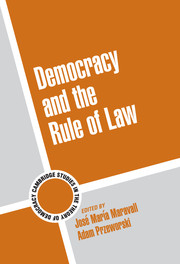Introduction
Published online by Cambridge University Press: 09 November 2009
Summary
Our central question is why governments do or do not act according to laws.
The traditional answer to this question has been that the law has an autonomous causal efficacy. People obey the law because it is the law: actions follow prior norms. This view is now being contested by arguments that law cannot be treated as an exogenous constraint on actions. In some situations, the actions that individuals want to and do undertake are stable and predictable even if they do not implement any antecedent laws.
The normative conception of the rule of law is a figment of the imagination of jurists. It is implausible as a description. Moreover, it is incomplete as an explanation. Why do people obey laws? Why do they obey a particular law? Would they obey any norm just because it is a law?
By a normative conception, we mean only the following. First, a set of rules constitutes law if and only if it satisfies some formal conditions. Second, the rules that satisfy these formal conditions are obeyed. Hence, law rules when actions follow anterior norms. The question whether the law rules is thus one of obligation, obedience, or compliance.
- Type
- Chapter
- Information
- Democracy and the Rule of Law , pp. 1 - 16Publisher: Cambridge University PressPrint publication year: 2003
- 18
- Cited by

